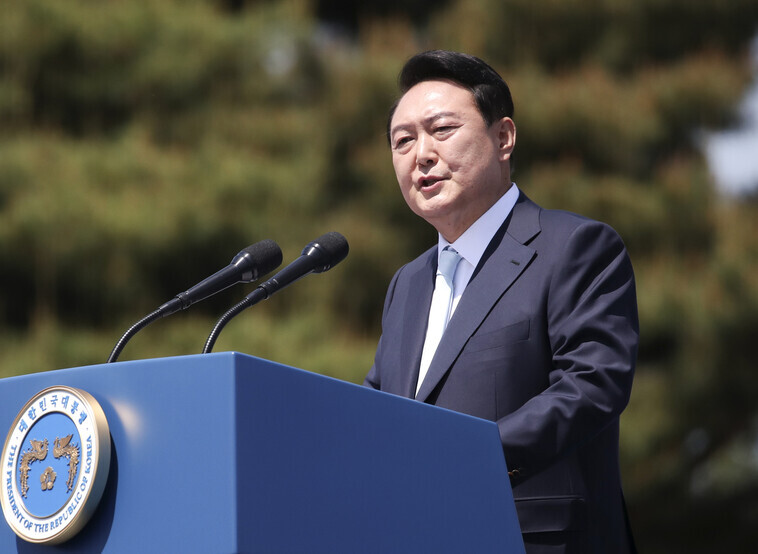hankyoreh
Links to other country sites 다른 나라 사이트 링크
[Editorial] Yoon forsakes message of unity to take shot at critics with “anti-intellectualism” remark

In his inaugural address on Tuesday, South Korean President Yoon Suk-yeol promised to turn Korea “into a country that truly belongs to the people; a country based on the pillars of freedom, human rights, fairness and solidarity; a country that is respected by others around the world and that fulfills its responsibilities on the global stage.”
New presidents typically use their inaugural address to explain to the nation their principles and the goals they hope to achieve during their five years in office. While Yoon stressed that greater freedom is key to resolving the crises and challenges facing Korea, he didn’t make a single mention of the unity or collaborative governing that our era demands. We’re concerned that Yoon may have proclaimed a unilateral approach to governing instead of advocating dialogue and compromise.
“The political process [. . .] has failed due to a crisis in democracy,” Yoon said in his message, attributing that failure to “anti-intellectualism.”
“Truth is grossly distorted because of animosity between different groups within society,” Yoon said. “When we choose to see only what we want to see and hear only what we want to hear; when the masses silence those who do not agree with them — this is how anti-intellectualism gravely imperils our democracy.”
The expression “anti-intellectualism” here — which Yoon reportedly inserted into the speech himself — was apparently aimed at those who have been critical of him, including the main opposition Democratic Party.
“When individuals disagree on certain issues and seek to reach a compromise, they can only do so when scientific facts and the truth form the basis of their discussions. This is the rationalism and intellectualism that is the foundation of democracy,” Yoon said.
Does Yoon mean to run the country while contesting the facts as in a court of law, rather than navigating disagreements based on respect and understanding for the other party?
It’s absurd for Yoon to claim that he’s being oppressed when others criticize him or attempt to check his power. He also deserves criticism for dividing the public into factions of intellectualism and anti-intellectualism.
Yoon’s inaugural address didn’t contain any clear prescriptions for resolving pending issues in Korean society. That’s very unusual considering that previous presidents have used their addresses to list the policies they intend to pursue.
Instead, the value that Yoon stressed was “freedom.” According to Yoon, prosperity, abundance and economic growth are derived from the expansion of freedom.
Yoon has said several times that a book he finds inspirational is “Free to Choose” by Milton Friedman. The freedom stressed in that book is one that maximizes market competition and personal responsibility. That runs counter to the campaigns in numerous countries since the COVID-19 pandemic pushing for the state to play a greater role in redressing social inequality and polarization.
Yoon’s total omission of redistribution and welfare expansion in his address can be understood in the same terms. His assertion that “rapid growth” and “a big leap” are the solutions to polarization and social division is reminiscent of the idolization of economic growth under Korea’s development-focused dictators.
As the Yoon administration gets underway, considerable challenges are in store both at home and abroad. Overcoming those challenges will require working with the opposition party as much as possible and gathering together the energy of the nation through a politics of unity. Hopefully, Yoon will recall that as president, he bears the infinite responsibility for running the country.
Please direct questions or comments to [english@hani.co.kr]

Editorial・opinion
![[Column] Tariffs on China: Trump was dumb, Biden dumber [Column] Tariffs on China: Trump was dumb, Biden dumber](https://flexible.img.hani.co.kr/flexible/normal/500/300/imgdb/original/2024/0520/191716191153918.jpg) [Column] Tariffs on China: Trump was dumb, Biden dumber
[Column] Tariffs on China: Trump was dumb, Biden dumber![[Column] What if Seoul took reunification by force off the table? [Column] What if Seoul took reunification by force off the table?](https://flexible.img.hani.co.kr/flexible/normal/500/300/imgdb/original/2024/0520/3017161928630494.jpg) [Column] What if Seoul took reunification by force off the table?
[Column] What if Seoul took reunification by force off the table?- [Editorial] Intensifying US-China rivalry means Seoul must address uncertainty with Beijing sooner than later
- [Column] When ‘fairness’ means hate and violence
- [Editorial] Yoon must stop abusing authority to shield himself from investigation
- [Column] US troop withdrawal from Korea could be the Acheson Line all over
- [Column] How to win back readers who’ve turned to YouTube for news
- [Column] Welcome to the president’s pity party
- [Editorial] Korea must respond firmly to Japan’s attempt to usurp Line
- [Editorial] Transfers of prosecutors investigating Korea’s first lady send chilling message
Most viewed articles
- 1Xi, Putin ‘oppose acts of military intimidation’ against N. Korea by US in joint statement
- 2Kim Jong-un wanted to meet with residents of shelled Yeonpyeong Island in South, Moon recalls in mem
- 3To weigh costs and benefits, Korea must stop treating US troop presence as a sacred cow
- 4[Column] Tariffs on China: Trump was dumb, Biden dumber
- 5[Column] What if Seoul took reunification by force off the table?
- 6[Editorial] Transfers of prosecutors investigating Korea’s first lady send chilling message
- 7Berlin mayor hints at tearing down ‘comfort women’ memorial in city
- 8KEPCO undergoes repairs for cracks in nuclear reactor containment buildings in UAE
- 9[Photo] Twitter now lets users decide who can reply to their tweets
- 10Smartphones have been shown to hurt brain development — can Korean kids kick the habit?